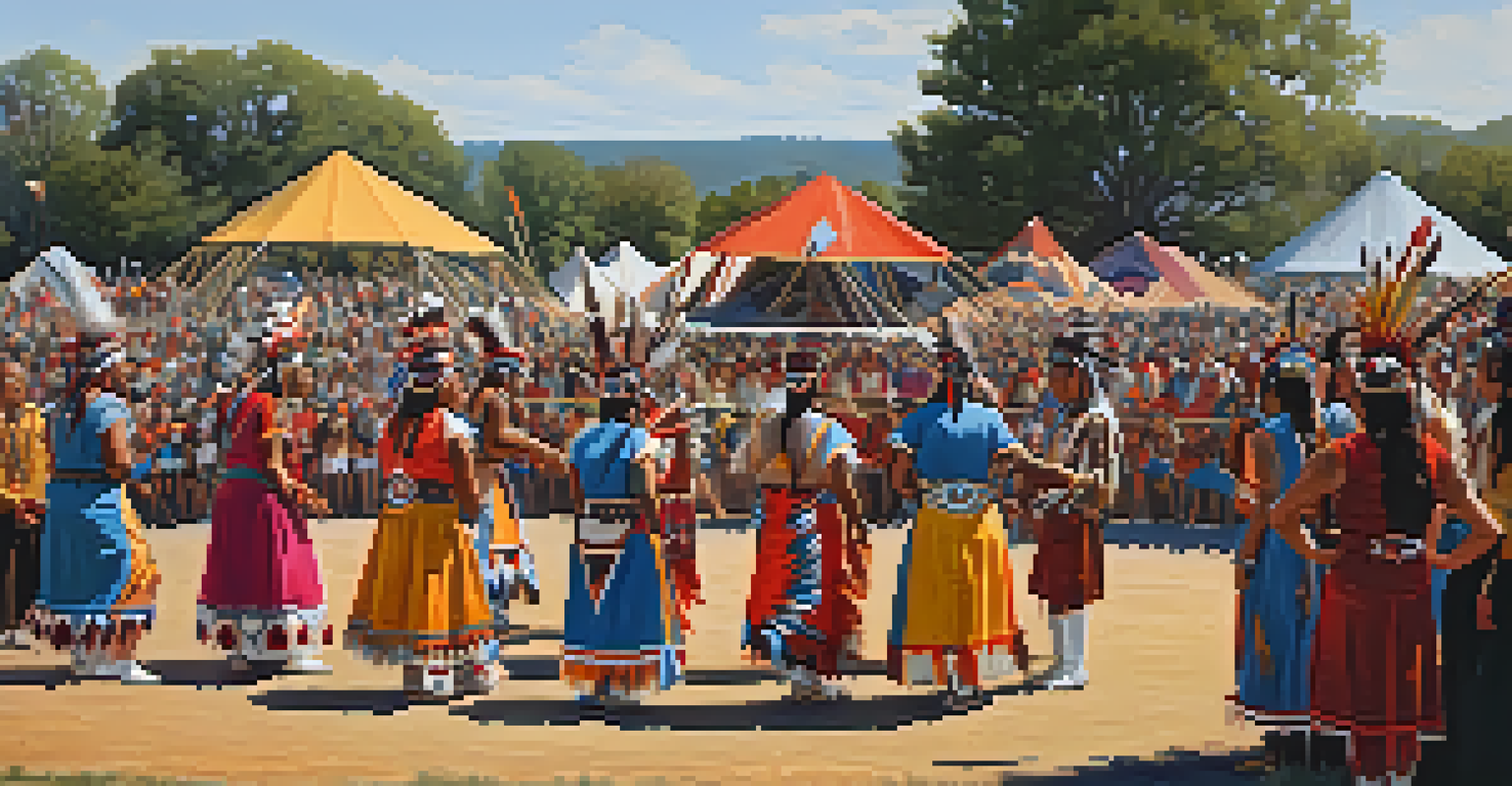The Role of Music in Cultural Ceremonies and Emotional Bonds

The Universal Language of Music in Cultures
Music is often described as a universal language that transcends borders. Every culture has its unique musical traditions, which reflect its values, history, and collective experiences. From tribal drumming to classical symphonies, music serves as a means of expression that connects people across generations.
Music can change the world because it can change people.
In many societies, music is woven into the fabric of daily life, marking significant events and celebrations. For example, African communities utilize drumming and singing to tell stories and preserve their heritage. This connection to culture creates a sense of belonging and identity for individuals within the community.
The rhythms and melodies of a culture can evoke strong emotions, from joy to sorrow. This emotional resonance underscores how music can foster empathy and understanding, allowing people to relate to one another on a deeper level, even if they come from different backgrounds.
Music's Role in Traditional Ceremonies
Ceremonies such as weddings, funerals, and religious rites often feature music as a central element. These events create moments of significance, where music helps participants navigate their emotions and connect with the occasion. For instance, a wedding march signals the beginning of a new life chapter, while hymns at a funeral provide solace and remembrance.

In many cultures, specific songs are chosen for their symbolic meanings, reinforcing the themes of love, loss, or celebration. The choice of music can also set the tone for an event, influencing how attendees feel and interact. This highlights the power of music to shape experiences and create lasting memories.
Music as a Cultural Connector
Music serves as a universal language that fosters connections and understanding across diverse cultures.
Moreover, the communal aspect of music during ceremonies fosters a sense of unity. When people gather to sing or dance together, they forge emotional bonds that can strengthen relationships and build community ties. This collective experience is often what makes ceremonies memorable and impactful.
Emotional Connections Through Music
Music has a unique ability to evoke emotions and memories, creating a profound connection between individuals. It can transport us back to specific moments in our lives, reminding us of experiences tied to particular songs. This phenomenon illustrates how music is intertwined with our personal narratives, enriching our emotional landscape.
Where words fail, music speaks.
For example, a song played during a family gathering might remind us of laughter and love, while a lullaby sung by a parent can evoke feelings of safety and warmth. These emotional ties to music can strengthen familial bonds, as shared songs become a part of a family's identity and legacy.
Additionally, music can serve as a coping mechanism during difficult times. Many people turn to music for comfort, whether it's playing an uplifting song after a breakup or listening to calming melodies during moments of stress. This emotional reliance on music underscores its significance in our lives.
Cultural Identity and Musical Expression
Music is often a reflection of cultural identity, showcasing the unique characteristics of different communities. It can capture the essence of a culture's values, struggles, and aspirations, serving as a powerful tool for self-expression. In this way, music not only entertains but also educates others about a culture's history and traditions.
In many instances, musicians draw on their cultural roots to create new sounds that celebrate their heritage. This blending of traditional and contemporary styles can lead to the emergence of new genres, enriching the global music landscape. For example, artists like Shakira incorporate elements of Colombian folk music into pop, creating a vibrant fusion that resonates with diverse audiences.
Emotional Power of Music
Music evokes strong emotions and memories, enriching personal narratives and enhancing familial bonds.
The celebration of cultural identity through music can also foster pride within communities. By embracing their musical heritage, individuals reinforce their connection to their roots, inspiring future generations to honor their culture and keep its traditions alive.
Rituals and Music: A Powerful Combination
Rituals are often accompanied by music, enhancing the significance of the experience. Whether it's chanting during a religious ceremony or playing a specific melody to mark a rite of passage, music adds depth and meaning to rituals. This synergy reinforces the emotional impact of the event, making it more memorable for participants.
In some cultures, rituals are entirely centered around music, such as the powwow ceremonies of Native American tribes, where dance and song are vital components. These gatherings not only celebrate cultural heritage but also promote healing and community bonding, showcasing the therapeutic aspects of music.
The interplay between music and ritual can also serve as a form of communication with the divine. Many cultures believe that music has the power to connect them with higher spiritual realms, making it an essential part of their religious practices. This sacred relationship further emphasizes music's role in shaping cultural identities.
The Impact of Modern Technology on Music and Culture
In today's digital age, technology has transformed the way we create, share, and experience music. Platforms like Spotify and YouTube have democratized access to music, allowing people from diverse backgrounds to discover and appreciate various cultural sounds. This shift fosters a global appreciation for different musical traditions, promoting cross-cultural connections.
Moreover, technology has enabled musicians to collaborate across borders, blending styles and genres in innovative ways. This fusion not only enriches the music industry but also allows for the exploration of new cultural expressions. For example, the rise of genres like reggaeton showcases how music can evolve through collaboration and cultural exchange.
Technology's Influence on Music
Modern technology has transformed music creation and sharing, promoting cultural exchange while challenging traditional forms.
However, this accessibility also comes with challenges, such as the potential dilution of traditional music forms. As global influences permeate local cultures, there's a delicate balance to maintain between innovation and preserving cultural heritage. This ongoing conversation highlights the importance of respecting and honoring the roots of musical traditions.
The Future of Music in Cultural Ceremonies
As society continues to evolve, so will the role of music in cultural ceremonies. The blending of traditional practices with contemporary influences may lead to new forms of expression that resonate with future generations. This evolution presents an exciting opportunity for communities to innovate while honoring their heritage.
Moreover, as cultural diversity becomes increasingly celebrated, we can expect to see a greater fusion of musical styles in ceremonies worldwide. This cross-pollination can enrich the experiences of participants, fostering a sense of global community while still valuing local traditions.

Ultimately, music will remain a cornerstone of cultural ceremonies, providing emotional connections and shared experiences. By embracing both tradition and innovation, we can ensure that music continues to play a vital role in our lives and the ceremonies that shape our identities.